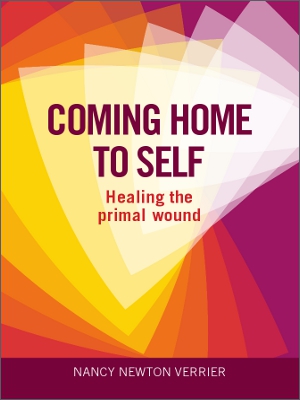
Coming home to self
£19.95
Nancy Verrier’s book, The primal wound, in which she elaborates on the “wound” that results when a child is separated from their mother, and the lifelong consequences this can have, is a classic in adoption literature. In the sequel, Coming home to self, Verrier considers the effects of separation trauma on brain development and offers an insight into the barriers that prevent many adopted people from achieving an authentic, mature and satisfying adulthood.
In a broad sense, this book has two main objectives: one is to help adopted people find the authentic Self, a self which has been distorted by living without genetic markers and mirroring (being reflected back) as they grew up in non-biological families. The other is to help them come into their own power and sense of responsibility.
Coming home to self offers a way for change, for the inner wounded child to grow up and respond to their environment – family, friends, relationships – in a more appropriate manner in order to achieve fulfilment and experience joy.
Who is this book for?
Coming home to self, like its predecessor The primal wound, is a classic in adoption literature. It offers adopted people validation for their feelings, explanations for their behaviour, a context in which to situate and make sense of their experiences, and ways to help move forward and achieve meaningful relationships.
The book is a must for anyone struggling with unexplained feelings and insecurities caused by adoption, or for anyone involved with adoption who would benefit from an insight into how adoptees may think and feel.
The insights that it brings to the experiences of abandonment and loss will contribute not only to the healing of adoptees, adoptive families and birth parents, but will bring understanding and encouragement to anyone who has ever felt abandoned. This is essential reading for anyone involved in adoption – adopted people, adoptive families, birth parents and adoption professionals.
What you will find in this book
This is a demanding book. It can be a difficult and painful read because of the emotions it evokes in all members of the adoption triad. But it can also bring relief as it can be a great help in acknowledging, understanding, and validating the wounds created by the trauma of separation between mother and child, and in offering a way forwards.
This understanding can help adopted people, adoptive parents and birth parents. It can provide validation for the experiences and feelings of adoptees, who have often felt misunderstood; it can bring solace to birth mothers, who have long been denied the truth of their loss; and it can be a source of information for adoptive parents, so that they can better understand and respond to their children.
'This book is about getting out from under the burden of being a victim. We cannot heal from something unless we acknowledge that it exists. There is no one, in my opinion, who is more traumatised (i.e. victimised) than a newborn infant who is separated from her mother, her heritage and her genetic history. It is like experiencing a terrific implosion, then growing up with genetic amnesia, no reference points for one’s being, no reflection of one’s Self. Some adoptees are keenly aware of this, yet feel abnormal for this awareness. Other adoptees, never having known anything else and not being in touch with their feelings, may think that whatever they are experiencing is normal and “no big deal”. All trauma is a “big deal”, and has an influence on one’s basic sense of Self…A child who is separated from her mother in infancy is affected by this separation and sees the world, herself and others through the lens of that abandonment, whether she understands it or not.'
'It is only through acknowledging, understanding and addressing our pain, in the presence of others, that we can participate in a life of empowerment and peace.'
Author
Nancy Verrier, M.A., the mother of two daughters – one who is adopted and one who is not – is an advocate for children. She holds a master's degree in clinical psychology and is in private practice in Lafayette, California. In addition to her clinical and adoption work, Ms. Verrier writes and lectures about the effects of early childhood trauma and deprivation caused by premature separation from the mother under various circumstances.
NOW AVAILABLE IN EBOOK AND HARD COPY
This title is now available in digital-only format for immediate access. Purchases are held in your own personalised online library and accessed via your browser or through the app on your phone or tablet.
Questions about eBooks? Check out our FAQs£19.95
Reviews
A very helpful book, giving an understanding of trauma in early childhood – not just in the adoption process. Author shares her experience in a very generous and comprehensive way. Would recommend it to those undertaking adoption – birth mother or adoptive parents but also to counsellors working with early childhood trauma especially in the case of adoption.
Mrs. S. T. Griffiths, five stars, Amazon.co.uk
This is an important book for members of the adoption triad who are struggling to understand their own and others’ emotional state and behaviour. It is also essential reading for professionals working with the triad members and their partners. Her other book, The primal wound, is accepted as the most important writing on adoption and its associated wounding. This book focuses on the ways to work through the trauma of adoption and certainly is helpful in this respect.
SubaCrone, Amazon.co.uk
